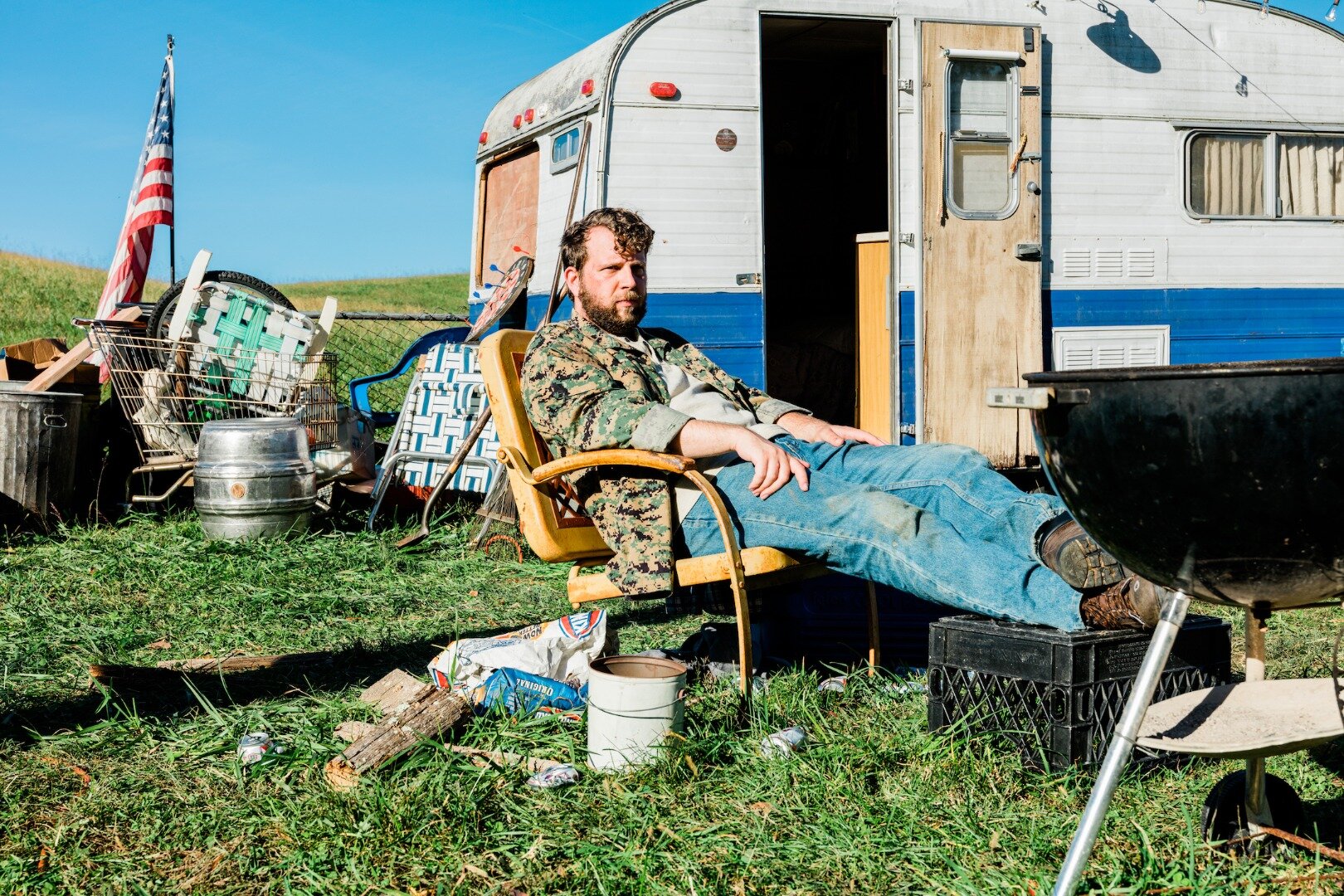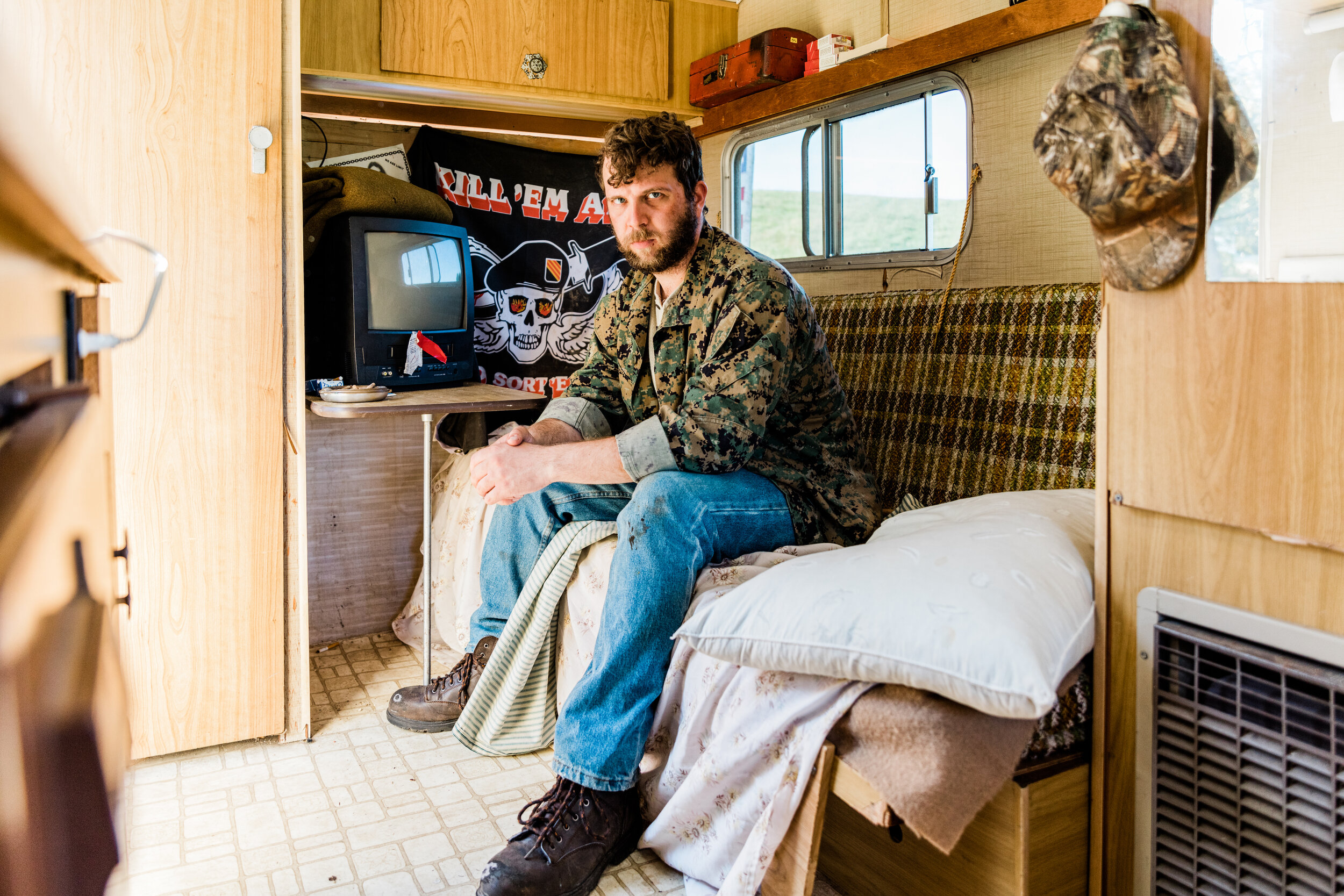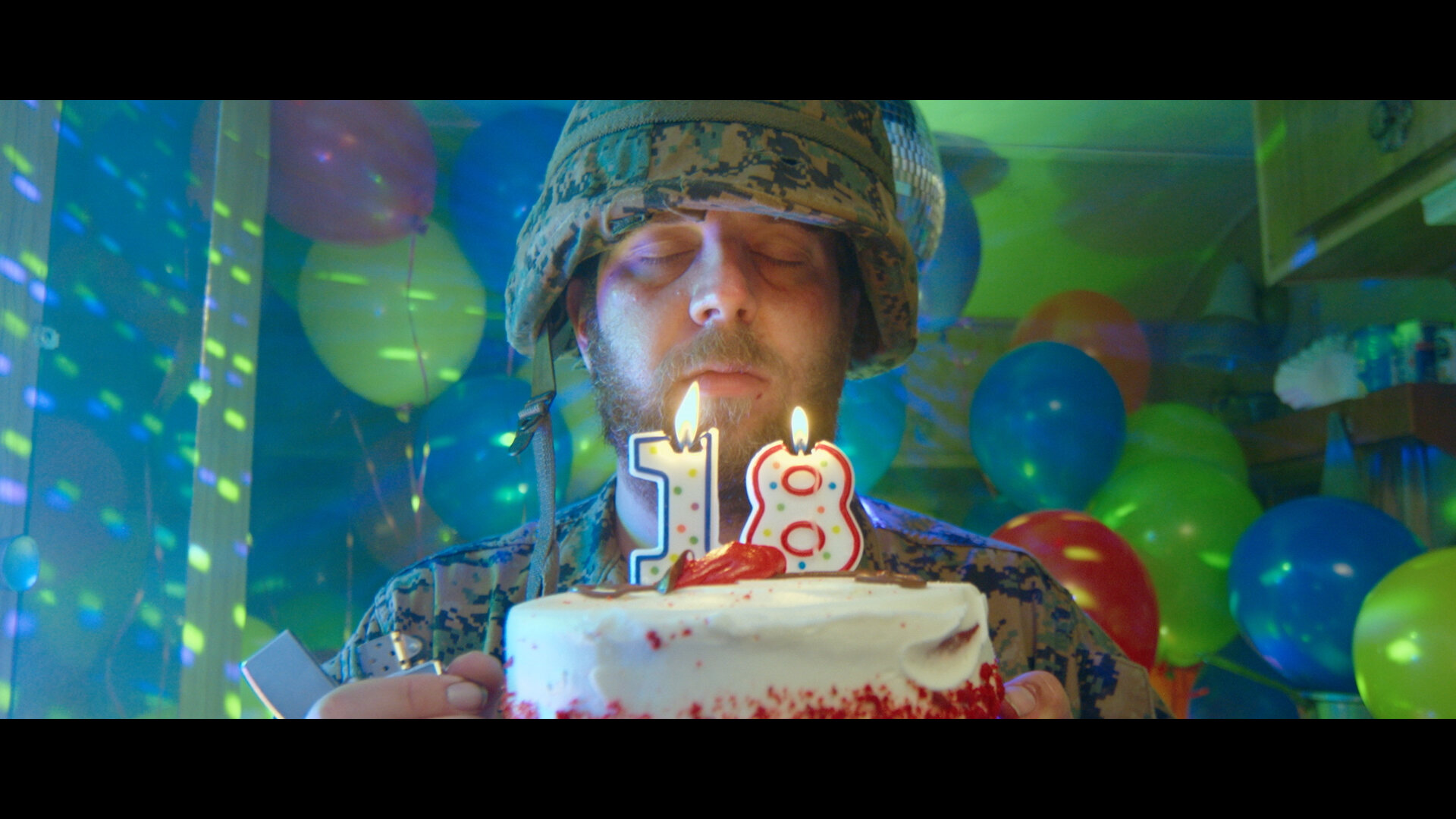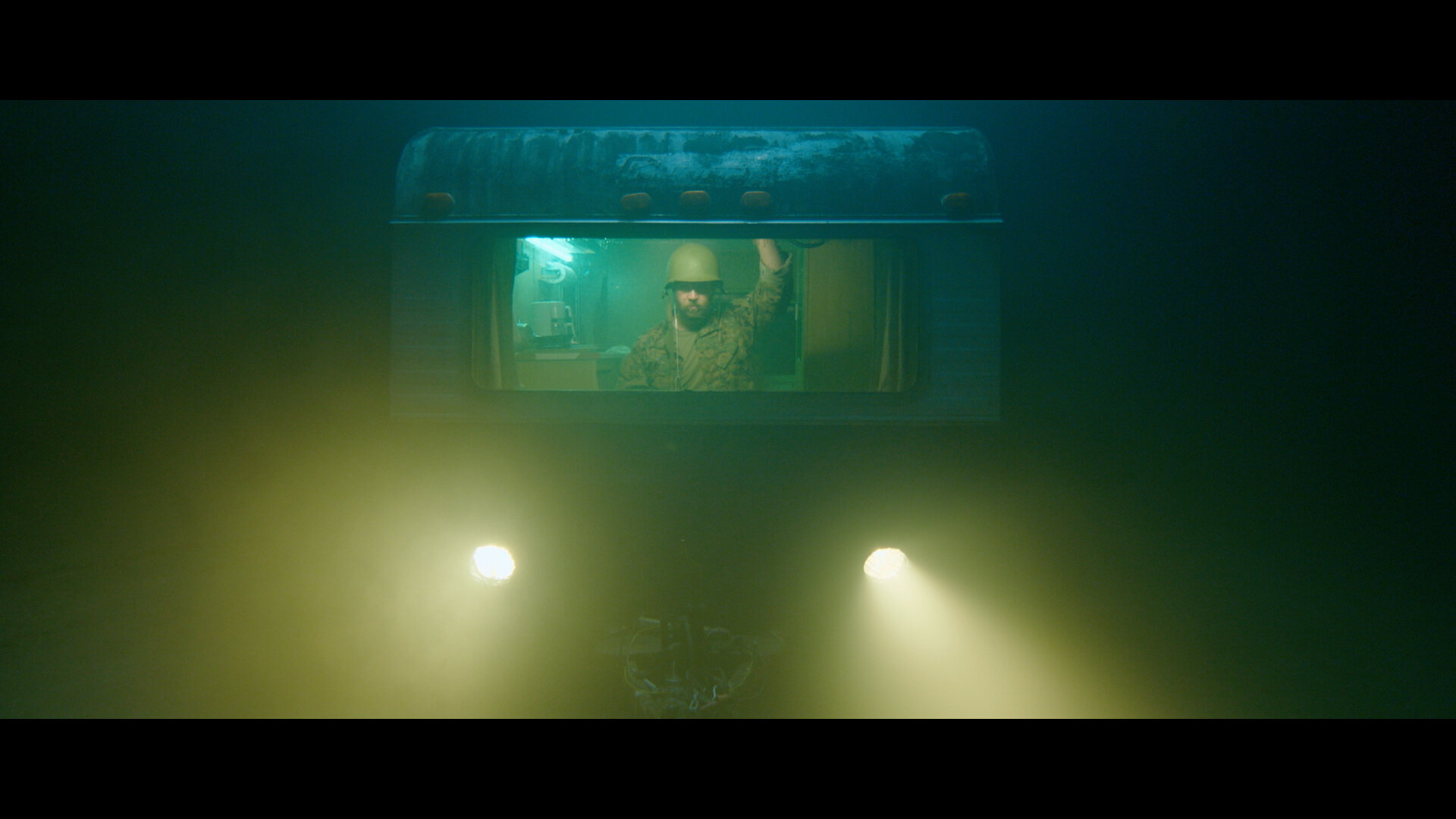First, it’s a movie, not a recording of a staged performance. The plot of Soldier Songs by Daniel T. Little revolves around the perceptions versus the reality of a soldier’s life at different stages - as a child with toy soldiers, a teenager playing war video games, an eager military recruit, a soldier in battle, and a father receiving dreaded news. Technically, it is a monodrama, only one performer. But first, a preamble:
Let us begin with the last paragraph of the Composer’s Note, and keep in mind my question, who is this opera for?
“I am often asked if Soldier Songs is an anti-war piece, but it’s not that simple. I never intended for it to prove a point, or even to deliver a specific message. I selected and edited these conversations more as a way of sharing than as a way of convincing. I hope that Soldier Songs conveys what I gained by writing it: recognition of the soldier’s plight and a due measure of compassion.”
The Soldier walks along the ridge line in the opening scene from Soldier Songs, filmed on location at Brandwine Conservancy, scene of a bloody battle in the Revolutionary War. Photo by FreshFly; courtesy of Opera Philadelphia.
Regardless of why, do not enter this experience lightly. Opera Philadelphia’s is the second production of this opera that I have seen recently. I also watched Pittsburgh Opera’s excellent production in December. That performance was a filmed stage production, not a movie. Its showing was planned to be before a live, masked, socially-distanced audience; then, at almost showtime, the post-Thanksgiving COVID-19 surge across the country forced PO to instead show a filmed recording of the dress rehearsal. Despite being an excellent production with impressive multimedia effects and an outstanding performance by baritone Yazid Gray, I chose not to write about it at that time for personal reasons. First, my generation can be divided into two groups, those who served in Vietnam and those who did not. I did not…but lived with the fear I might be called, and daily lived with the war’s effects on my family members who did. We all lived through the daily images on television and the public turmoil engendered by the war, and Vietnam vets often took the brunt of that turmoil after returning home from an unpopular war; they were stigmatized by many when they should have been honored for having served their country. That’s so yesterday, you say? Opera Philadelphia points out that anyone who just reached age 20 is yet to live in a time when the United States is not at war. Yes, Soldier Songs pushed some of my buttons, and it will likely do so for others as well.
Another personal reason for me was a timing issue; it was holiday season. Soldier Songs is dark and heavy, imparting to its audience, in measure, an hour’s worth of the PTSD (Post Traumatic Stress Disorder) experience, and in December just past, having fought pandemic depression for nine months, I wanted to sing Jingle Bells and decorate the tree, not write about the awful pain and cultural issues surrounding the human cost of war. With all respect to Pittsburgh Opera and Mr. Gray, I just couldn’t do it. But Christmas is over, and vaccines are being given; hopefully, the end of the pandemic is near. Thus, now I can again deal with this topic. Besides, war and its toll on our young men and women, and their families, and our national psyche continues, as it always has. Unfortunately, writing about Soldier Songs will likely be ever timely.
Baritone Johnathan McCullough as the Soldier. Photo by FreshFly; courtesy of Opera Philadelphia.
My experience with veterans is consistent with Composer Little’s. Mostly, those who served in Vietnam would not talk about it, and their opinions about the war were not to be challenged in their presence; their feelings were too raw. They felt that we cannot know what it was like without having gone through it; this I do not contest, but I think Soldier Songs helps. The themes of estrangement, isolation and loneliness are always present in the drama along with more serious issues of mental health deterioration. Composer Little’s opera can claim some moral authority in this regard; it is filled with soldier’s comments from his interviews with U.S. veterans of wars in Vietnam, Iraq, Afghanistan, and World War II.
Still, I wondered what comments veterans who saw his opera might have made. I inquired of OP whether any reviews were available from critics who were themselves combat veterans. No luck there, but I was pointed to articles about the 2016 San Diego Opera production of Solider Songs that included meetings the company held with veterans support groups. The articles further speak to the authenticity of Mr. Little’s opera. That production, which premiered on Veterans Day, was directed by Tomer Zvulun, who is a combat veteran; he also directed the opera that year for his home company, Atlanta Opera. One of the articles quotes a veteran who lost both legs in Iraq; he expressed his appreciation for SDO’s attempt to connect with veterans: “When it comes to the extremes of combat – life and death situations – it’s very difficult to find someone who you can have an honest conversation with," he said. "Where you can talk and be heard and not judged. And be understood.”
Let me end this preamble with a postscript. Soldier Songs should come with a warning label and a follow up exit check. Opera Philadelphia offers both with an introduction by Rene Fleming in a film clip labeled “Soldier Songs: The Impact of Military Life”. This group of interviews with veterans is interspersed with comments from a health professional giving a medical perspective on the impact of war on the mental health of soldiers; resources for veterans are listed at the end.
The Soldier (Johnathan McCullough) outside and inside his isolated trailer. Photos by Dominic M. Mercier, courtesy of Opera Philadelphia.
Soldier Songs is a cultural experience provided by a work of art. Daniel T. Little is both the composer and librettist. He is also a percussionist, and his “opera” blends music of different styles in minimalist fashion that is both engaging and fitting of the story, so much so that sometimes I listened consciously to the remarkable music and sometimes it simply became part of the telling for me. The part I heard consciously fit the mood, which was frequently mental turmoil, often disturbed. The music played by seven instrumentalists was overseen and coordinated by Opera Philadelphia Orchestra conductor Corrado Rovaris. Baritone Johnathan McCullough sang to recordings prepared by Mr. Rovaris while the scenes were being filmed. In all the preparations and production of the opera, pandemic cautions and restrictions were observed.
The instigator, sole singer, and director of this movie version of Soldier Songs is Mr. McCullough, a singer who gave early notice of his arrival to opera fans in the mid-Atlantic from his work with Curtis School of Music, Opera Philadelphia Young Artist Program, and Wolf Trap Opera Filene Artists. I have seen him previously in performances with Wolf Trap Opera. In my blog report on his performance as Figaro in The Barber of Seville, I advised readers to note the spelling of his first name, that they would want to remember him. Though his talent as a singer and stage performer was in evidence in those performances, one could not have predicted the depth of his theatrical abilities or his creative drive which are so amply demonstrated in Solider Songs. Clearly, this work further establishes him as a rising star in opera roles, and might lead him to purely acting roles well.
The Soldier (Johnathan McCullough) in his trailer having a flashback to his 18th birthday when he enlisted in the military and in a tank driving simulation. Photos by FreshFly; courtesy of Opera Philadelphia.
Mr. McCullough approached Opera Philadelphia with this project based on an idea he had before the pandemic began, but then it gained urgency as a work well suited for a time when on screen viewing is all that is possible; OP helped him acquire funding and added it to the Opera Philadelphia Channel lineup where it will remain available on demand until May. In his Director’s Note, he expresses heartfelt concern for veterans suffering mental issues and an awareness of what they are dealing with: “Sometimes this goes a step further and people can enter a dissociative state where they lose touch with reality and may feel as if they are watching their life play out as if it were a movie,” and he adds to the intended audience question with, “I can tell their stories and hopefully de-stigmatize what it is like to live with mental health issues while spreading awareness of this silent condition.”
Mr. McCullough served as screenwriter along with producer James Darrah (I loved Mr. Darrah’s Semele in OP’s 2019 Festival). This team worked with Director of Photography Philip Bradshaw to produce a version of Soldier Songs that is enhanced by cinematic techniques – use of natural scenery, the ability to focus the viewer’s attention via closeups of faces and objects, and images that flow and can quickly change. The action takes place mostly within a dilapidated trailer sitting alone in a field away from roads. The objects in the trailer and its use to simulate the soldier driving a tank are used for cohesive story telling. The images of a pistol moved in and out of a drawer posed a constant threat of suicide or other violence. This movie version adaptation of the opera Soldier Songs arrives at its unique artistic value by taking advantage of means not available for stage direction; it is a fine film. Thus, it will have lasting value even beyond the pandemic when opera houses open again, and as a film available for four more months, it has an extraordinary audience reach for an opera.
Baritone Johnathan portraying a grieving father in Soldier Songs. Photo by FreshFly; courtesy of Opera Philadelphia.
In posing the question of who this opera is for, I mainly wondered if it was meant for both those who had served in the military and those who have not, as well as an artistic experience for the arts community that Opera Philadelphia serves. Clearly, each hand involved in bringing this production to realization pushed it in the direction of their intended audiences. I think Soldier Songs, the movie, can be distilled down to “understanding” in search of an audience, any audience, every audience. Or to put it in infantry terms, it’s mission is to close and capture.
The Fan Experience: Soldier Songs can be viewed with a $99 Opera Philadelphia Channel season pass or as a seven-day rental for $25, streaming on demand. The film and sound quality are quite good and can be accessed on any internet connected device.
If the season pass is within your budget, I recommend it; there are many worthwhile productions on the Channel as Opera Philadelphia continues to be today’s leading company in pushing opera’s frontiers. For a more in-depth discussion of the Opera Philadelphia Channel and its access, see my report at this link.







